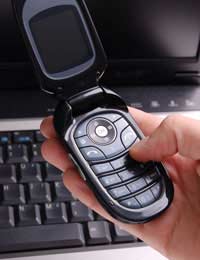Telephone Systems

The telephone does not have to be an impossible form of communication for deaf people to use. In fact there are several telephone systems which make it easy for deaf or hard of hearing people to hold conversations across the miles, just as for the rest of us. Which systems they choose to use will often depend on the level of hearing they have left and whether they have been deaf from birth or developed it in later life.
Text Messages
Text messages are one of the most straightforward and easy to understand forms of telephone system for deaf people, but also one of the most time consuming. The basic premise behind the system is simple. The callers type everything out rather than speak it and what they are saying appears on a screen in front of the recipient. This is fine for short and sharp messages, as most people now use text messages or SMS messages. But for longer conversations it can be both costly and time consuming, and email and instant messaging services online are usually a better bet. It would take most people an age to have a full conversation – and the cost is prohibitive, despite some companies offering a discount for deaf and hard of hearing people. It still works out a costly way of holding a conversation – but, as for hearing people – is the perfect way to exchange short and sharp messages.
Typetalk
Typetalk is the service provided by the RNID and BT to allow deaf people to use the phone. Anyone is able to make a Typetalk call to a deaf person, simply by dialling a special prefix. The deaf person will need a special textphone to receive it. The deaf person is able to either speak their part of the conversation direct or type it if that is easier for them. The other person will then speak back and the Typetalk operator will type the reply directly back to you. All calls are completely confidential. The service is especially useful for older people who may not be conversant with typing on a phone. In addition, if people can speak, they are able to do so rather than having to type everything out. The Typetalk operative should be able to listen and type replies simultaneously, a much needed talent.By calling textphone to textphone and typing out messages yourself, it is possible to bypass the need for an operator although this is obviously a more time consuming type of telephone system.
The rise in text related technology has made it far easier for deaf and hard of hearing people to use telephone systems. The Typetalk service is especially useful as it means no one apart from the deaf person needs any special equipment. Thus the calls can be made to and from everyone. When buying a textphone look out for its advantages and disadvantages, all textphones are not the same. Although they should all fulfil a basic function, the levels at which they do this and the added extras can vary tremendously.


Re: The Listening Bus
Hi, We would like to book the listening bus for our school community. What is your availability for the summer term 2025? What are the costs? We…
Re: Sign Supported English
Ex Mary hare school. Love sign supported English as Aspie. More useful Less emotional As words Not emotion More helpful to deaf Aspies
Re: The Listening Bus
Hi, I am the inclusion leader and SENCo of a school with a specialist resource provision for deaf pupils within a mainstream school. Staff say…
Re: The British Sign Language Broadcasting Trust
I’m not effected in any way or suffer from any communication issues personally. I was curious as to why…
Re: Sign Supported English
I want a series of videos to learn SIGN SUPPORTED ENGLISH FOR BEGINNERS. Can you please help?
Re: Makaton
Hello We are a small pre-school and we are trying to teach all our children Makaton to help all of them communicate regardless of their own…
Re: Sign Supported English
Can anyone help me ? I am trying to find an SSE class or lessons in Kent and have had no luck. Failing that, are there any publications I…
Re: Hands on Signing
Hi I have a blind child and he has a moderate hearing loss. I wonder if you can help me to teach him sign language and I need to learn as well.…
Re: Sign Supported English
Does anyone know of any programmes or resources for using SSE with older people whose hearing has deteriorated in later life?
Re: Makaton
what is makaton??????????????????????????